Editor’s Note: The Value of Community
I have a confession to make: I missed Arrival Day this year.
It’s always notable because of what it represents: new faces, new hope, a new start. This year, however, was more poignant than ever, as it wasn’t just fresh-faced (and masked) new first-years and their parents stepping foot on campus for the first time. For many of us—older students, faculty, and staff alike—the start of the 2021-2022 academic year represented our first time being on campus together after a long hiatus of remote work, remote study, or just taking a year off to regroup and reflect under the specter of COVID restrictions.
Fortunately, a few days later I was treated to a more spectacular happening. One that reminded me that it doesn’t have to be a special day to appreciate that indescribable alchemy, that palpable energy that makes Wesleyan so . . . Wesleyan.
It started with the sound of music streaming into my office from Foss Hill. Then the distant but familiar buzz of people talking, laughing, playing games—not just passing by or on their way to class or the residence halls, but gathering in casual communion, making plans, cooking up schemes, engaging in good-natured debate, and just generally enjoying the beauty of a normal day spent in a normal way. Who knew “normal” could feel so special? Almost sacred? It was the student involvement fair, an annual event encouraging students to try something new, join a club, fight for a cause, and make new friends. But in that moment, it was so much more. It was the sound of campus coming alive again.
Of course, things aren’t completely back to normal. For those of us on campus and for our greater Wesleyan network across the country and the globe, COVID has forced us to be more cautious and mindful of how we interact and influence each other. But having come through this past year of distancing, we’ve learned to appreciate the value of community and the many ways in which we make each other better and push each other farther.
With this issue, we turn our attention to the people and programs that are re-affirming our sense of community and finding new ways to connect and better understand one another. Wesleyans like Rachel Waugh ’17, founder of the Museum of Food and Culture, and Eric Pallant ’80, author of Sourdough Culture, who like many during the pandemic, turned to food and baking as a way to not only bring comfort but also initiate discourse on difficult issues. Or Marc Casper ’90, P’23 and new leadership in the College of Film Studies, who are looking to future generations and setting the groundwork for innovations in improving global health and capturing the human experience on film. Meanwhile Professor Martha Gilmore keeps her eye on an even more distant objective—to explore the secrets of Venus with two major grants from NASA, in order to better understand Earth’s own geological history and our place in this universe.
I may have missed this year’s Arrival Day, but with the campus full and the energy and excitement of the students buoying us up, it’s clear that every day is an opportunity to celebrate the start of something new.

